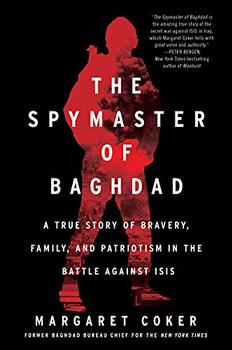Summary | Excerpt | Reading Guide | Reviews | Beyond the Book | Read-Alikes | Genres & Themes | Author Bio

A True Story of Bravery, Family, and Patriotism in the Battle against ISIS
by Margaret CokerThis article relates to The Spymaster of Baghdad
Known for its brutal track record of executions and torture of hostages and civilians (including women and children), some may find it surprising that the Islamic State of Iraq and Syria (ISIS) jihadist group attracts a fair number of female recruits. While there are mitigating factors that vary for each woman, for many the appeal seems to lie (somewhat ironically for a group so harshly restrictive of women) in the increased level of agency that membership in this organization can provide.
According to the London School of Economics (LSE) Middle East Centre, as of July 2018 there were over 4,700 female members of ISIS. Among the myriad jihadist movements and groups formed and proliferating over the last two decades, ISIS has proven to be the most popular among potential female recruits. In research published in 2019, the Lowy Institute reports that since the establishment of ISIS in 2014, "15 per cent of voluntary migrants to the caliphate have been women."
This report goes on to explain that a large part of the appeal of ISIS for women revolves around a sense of empowerment in contributing to a greater cause, one based on the religious and political sentiments of re-establishing the Islamic caliphate. ISIS has harnessed these beliefs by offering recruits permission to do many things forbidden to women under Islamic law, such as the stricture against traveling alone. It also portrays their roles as wives and mothers as active choices rather than passive duties, and essential to the ISIS cause.
While women are not recruited for military duty (this is mostly prohibited, except under certain circumstances), they are told their participation is needed for "building the new world order through the construction of an Islamic utopia," the LSE Middle East Centre explains, "As such, women do not necessarily join to fight, but are attracted to the 'brand' of ISIS." While not serving in combat, ISIS uses women for security and recruitment details, most notably symbolized by the notorious al-Khansaa Brigade. The mostly French-speaking women of the unit act as a morality police force and receive weapons and weapons training. They patrol the streets looking for women in violation of the Islamic State's "decency codes," and inflict often violent punishments.
Even though the caliphate is no more and recent ISIS military defeats have dimmed its dubious star, the potential role of women as an active part of the organization's rebirth remains. The Lowy report explains the grim reality: "There is a global cohort of over 73,000 women and children (10,000 of them foreigners) in Kurdish camps who surrendered after the fall of Baghouz. The Islamic State considers this cohort, as well as other female supporters, a key part of its future survival." Many of the women in these camps have no affiliation with ISIS, and among those who do, many were coerced into joining by threat or false pretenses.
Filed under Places, Cultures & Identities
![]() This "beyond the book article" relates to The Spymaster of Baghdad. It originally ran in March 2021 and has been updated for the
February 2022 paperback edition.
Go to magazine.
This "beyond the book article" relates to The Spymaster of Baghdad. It originally ran in March 2021 and has been updated for the
February 2022 paperback edition.
Go to magazine.
The third-rate mind is only happy when it is thinking with the majority. The second-rate mind is only happy when it...
Click Here to find out who said this, as well as discovering other famous literary quotes!
Your guide toexceptional books
BookBrowse seeks out and recommends the best in contemporary fiction and nonfiction—books that not only engage and entertain but also deepen our understanding of ourselves and the world around us.